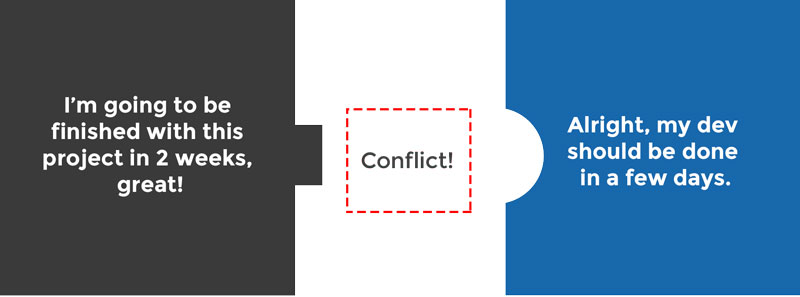For the first time in years, I almost vomited all over my keyboard.
..let’s back up a little.
It was a few weeks back, and I was sitting at my desk stringing together some beautiful code for a client of mine. As you can probably relate, sometimes when I get very involved in a project, I tend to neglect my basic human needs for sustenance.
As thirst overtook me, I hastily grabbed my delicious glass of Pepsi and immediately my body wanted to purge whatever I had just put in my mouth.
Why?
Well, I had accidentally taken a swig from the cup of milk that I’d poured earlier that morning. But still – I love milk just as much as I love Pepsi, so what was going on?

The truth was that in anticipation of some bubbly-deliciousness, my taste buds had been primed for Pepsi, so when I drank the milk it sent my brain into shock mode.
So what am I getting at here?
Expectations often taint your perspective of reality much more than reality itself, and you can use this to minimize conflicts with your clients or customers.
Expectations are everything.
You see conflict everywhere, but at the same time most of us don’t really see the conflict. Understanding why someone is upset is often very difficult to do, so I’m gonna give you a cheat sheet.
Conflict arises only when you don’t meet an expectation placed on you by another person (or vice-versa, of course).

I chose my words very carefully there. It’s quite a bold statement but let me show you why it’s so true…
You’re standing in line at the grocery store, and someone cuts right in front of you. You’re outraged and getting ready to sand this dude’s face with your quinoa…but why?
Some may say this person was rude, but still, why does someone being rude to you make you angry? It’s because you have a baseline expectation to be treated kindly by all people.
You can extrapolate this to every single conflict:
- Your boss is mad at you for under-performing? They expected you to do better.
- Your friends gets upset because you offended him? He expected you to be on his side.
- Your parents ground you for skipping school? They expect you to be honest.
- Your girlfriend says she isn’t able to connect with you? She expects intimacy from her partner.
- Your customer files a complaint because their subscription box was dented? They expected professionalism.
- Your client severs the relationship? They expected the relationship to manifest differently.
(That last point there also touches on why so many subconscious elements play a huge role in landing more client-service provider relationships, but I’ll touch on that another time.)
It’s true, as much as we’d like to think otherwise, we humans are very emotional creatures. That’s why managing expectations is key to maintaining healthy & happy relationships with other human beings.
[…] as much as we’d like to think otherwise, we humans are very emotional creatures.
Alright, so conflict sucks. How do you avoid it?
Let’s be real: it’s borderline impossible to avoid conflict in your life. But, you can minimize it (especially in your career) by adhere to few principles:
- Communicate expectations clearly.
- “Hey Judy, just so you know, this project is going to cost somewhere in the $20k – $30k range…does that work for you?”
- “Look Paul, I’m gonna be honest, this project is going to take 2-3 weeks longer than I originally estimated. What are your thoughts on adjusting the timeline?”
- Communicate expectations early.
- “Before we get started with your site audit, I just want to let you know that I was quite harsh — it’s nothing personal, I’m just being honest with my professional opinion. Is that okay with you?”
- Get consent beforehand.
- If you can get a client to agree to an expectation beforehand, the pill will be much easier to swallow when you deliver it.
- Be understanding of missed expectations.
- “Amy, I’m sorry. You hired me to solve this problem, and frankly this solution simply does not work. It’s going to take a few more weeks, but I’m certain we can get there. Can we try again?”
Bringing it all together, now!
So, if you want a healthy relationships in your life, simply make sure you’re managing expectations. You don’t have to supplicate everyone all the time, but as long as there’s no missed expectations, you’ll find that conflict tends to dissapear.
My challenge to you: Next time you need to have a difficult conversation with a potential client, think about what you can do to manage expectations to soften the delivery of your message.
As usual, let me know in the comments below what kinds of expectations you are setting for your relationships.
Once you become aware of it, and you’ll be shocked at how much expectation tends to influence the way you see the world.